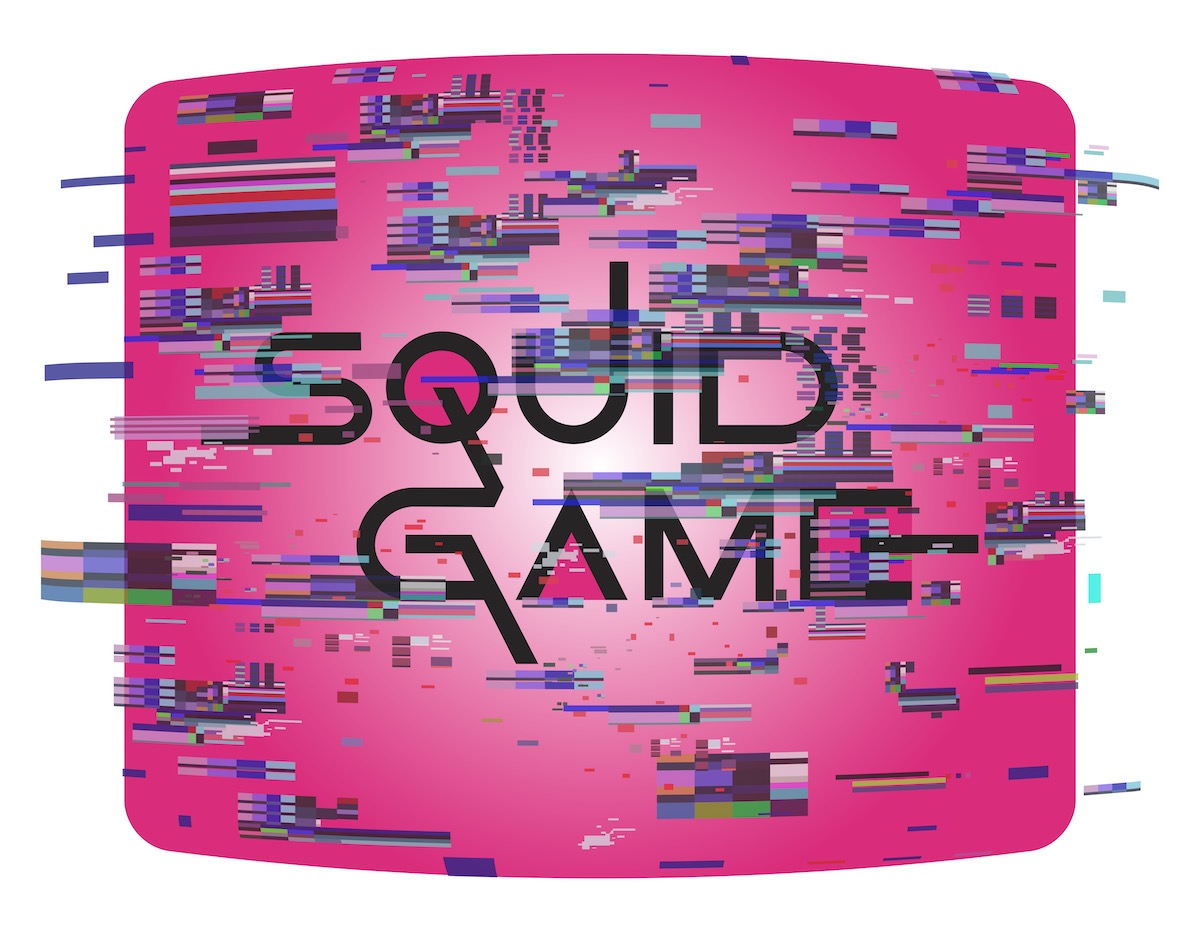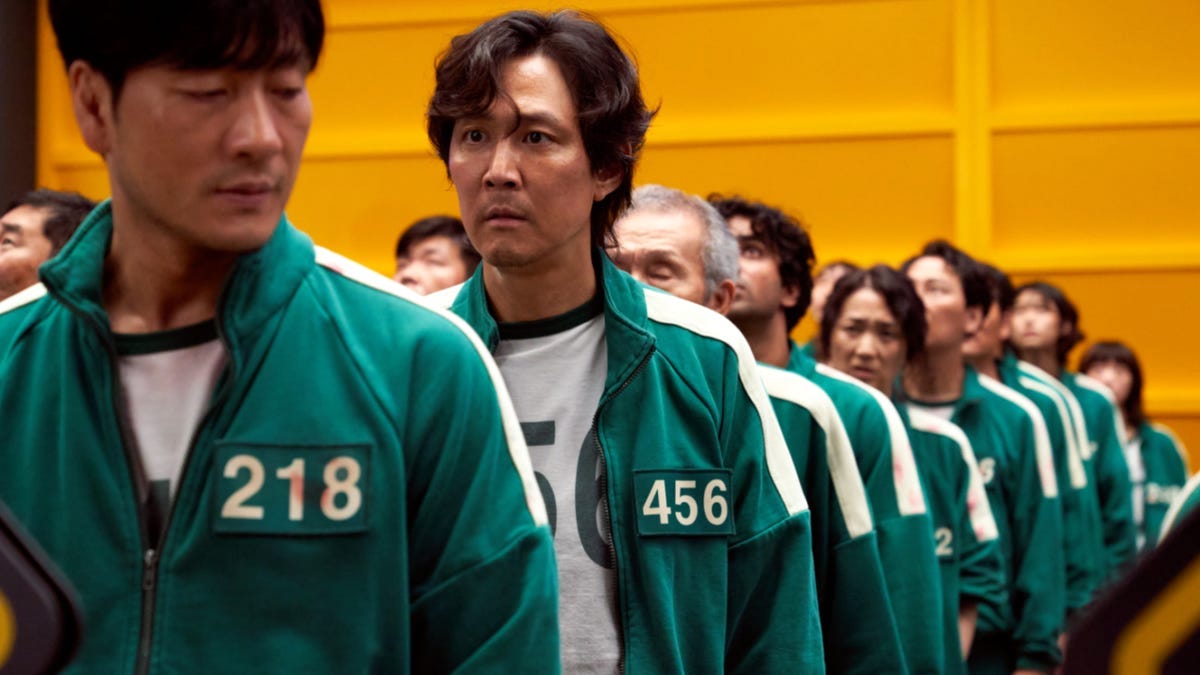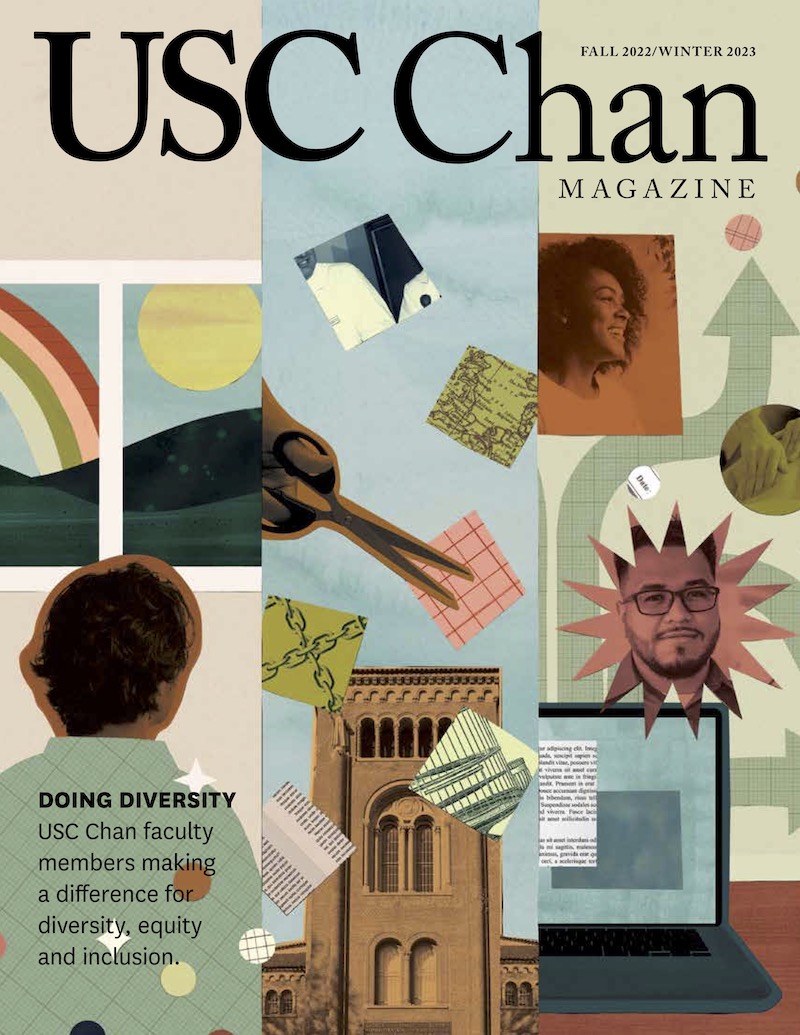More Than Just Fun and Games
Netflix’s sensation Squid Game highlights real-world issues for further consideration by occupational therapists and occupational scientists.
By Esther Jahng MA ’20, OTD ’21
Staff Member
It’s a typical Saturday night. After eating dinner and doing the dishes, I grab my favorites — Trader Joe’s dark chocolate roasted pistachio toffee, some mandarin oranges and a mug of brewed buckwheat tea — and head to the living room couch. It’s time to watch Squid Game.

No one else is home, but I am not alone in my weekend binge-watching. The Korean language thriller Squid Game became a global smash hit following its Sept. 2021 debut on Netflix. In the first 28 days following its release, it set the record as Netflix’s most-watched show with 1.65 billion hours streamed.
While watching along with a worldwide audience, I can’t help but think more deeply about a number of issues portrayed in Squid Game. The fictional series is set in South Korea, where people of all ages and from all socioeconomic backgrounds participate in a series of life-or-death games, the eventual winner of which receives a huge cash prize.
As a second-generation Korean American, the show’s enormous popularity brings me immense joy and pride. The show has more than its share of gore and violence, which would usually deter me from watching if not for star actor (and my celebrity crush) Lee Jung-jae.
As an occupational therapist, I see a number of complex issues prevalent in South Korean society through an occupational lens, dramatized as they are. A global sensation like Squid Game has relevance for occupational therapists and occupational scientists, and can spark meaningful conversations within our profession and discipline (if you haven’t yet watched but plan to — caution, spoilers are ahead!).
The contexts of childhood games
In Squid Game, participants are pitted against each other in contests that take the form of beloved childhood games that reflect South Korean historical, political and economic contexts. Watching the games on-screen brought back nostalgic memories of my own, as I remember often playing similar games (without the mortal stakes, obviously) as a child myself growing up in South Korea.
For example, Squid Game’s second round is the Dalgona challenge, a game that gained popularity in the 1950s following the Korean War. Dalgona is a honeycomb-like toffee made with melted sugar and baking soda. Commonly referred to as “ppopgi,” which means to pick or select, Korean children work to carefully remove the stamped shape pressed into the candy without breaking it. According to my mother, the suspense of not knowing if or when the candy would break, its affordable price and sweet taste that could not be reproduced at home, kept her and her neighborhood friends, regardless of socioeconomic status, entertained for hours. Although the game arose during an economically bleak time in South Korean history, ppopgi continues to be a popular childhood pastime today.
Squid Game’s third round, “Juldarigi,” or Tug of War, is commonly played during the first full moon of the Lunar New Year to strengthen village communities in preparation for harvest season. Another game, “Mugunghwa flower has blossomed,” also known as Red Light, Green Light, is named after Korea’s national flower, which symbolizes resilience due to its continuously blooming nature. For Korean people who historically experienced colonization by Japan from 1910 to 1945, playing the game, which includes a group chant of “Mugunghwa flower has blossomed,” is a nationalistic demonstration of solidarity, pride and patriotism.
The games illustrate the importance of understanding occupation from a relational perspective without compartmentalizing person, occupation or context, also known as the transactional perspective.1 In fact, understanding the origins and influences of these games lets us better understand how they have evolved from one generation to the next against the backdrop of Korea’s rapidly changing society.
The show’s namesake, Squid Game, was also a real game played by Korean children in the ’70s and ’80s. The show’s director Hwang Donghyuk has said that the title is a metaphor for how Korean society has become increasingly like a socioeconomic Darwinian battleground where only the fittest survive. “I wanted to create a sense of connection between the nostalgic games we played in our childhood and the sense of never-ending competition that modern adults feel,” Hwang said in a 2021 interview.
By reflecting on these points from an occupational justice perspective, we can think critically about how external forces and power differentials can impact and shape the occupations that people engage in. Hwang posed a similar question at a recent media forum: “I kept asking questions like, ‘who made this competition system in our society,’ and ‘who drives us into a corner’? This is the question [sic] that I want to ask everybody living in the midst of the pandemic in the 21st century.”
Occupational injustice in South Korea
In Squid Game, the fun and friendly childhood games rapidly devolve into horrific bloodbaths. The 456 adult contestants are initially unaware of the stakes involved, but quickly learn that losing a game is equivalent to dying. Even more sickeningly, the games are watched by wealthy VIP spectators who play along too by placing bets on the contestants’ odds of survival. This starkly contrasts with prevailing definitions of occupation in the OT and OS literature as the “subjective experience of joy and fun that comes from engaging in freely chosen, intrinsically motivated, self-directed meaningful occupations.”2
Furthermore, an interesting power dynamic is portrayed in how the organizers and guards treat the contestants as children, punishing them with death if they break any rules, and promising rewards for victory at the expense of everyone else’s life. The pink jumpsuit-clad guards consistently emphasize discipline and structure, and exercise absolute control under the pretense of “play.” Ironically, the Squid Game organizers perceive themselves as law-abiding citizens who respect the contestants’ contrived “choices.” For example, contestants are recruited to the Squid Game by receiving an invitation card with a phone number to call if they want to join in. And according to Squid Game’s third clause, players can cast a majority vote to either continue or stop the games. But when the third clause is exercised in episode three, more than 90 percent of the remaining contestants vote to return to the game, even after witnessing the terrible slaughter of the first round losers.

On the surface, these rules give Squid Game the veneer of a non-coercive, lawful sport in which players can come and go as they please. But we see that occupational choices are not equally available to all people from all socioeconomic circumstances.3 Throughout the series, organizers recruit massively indebted people to play Squid Game with the promise of a cash prize. The poverty and debt crisis in South Korea is a recurring theme, both in the show and in the real world. In 2021, household debt in South Korea was estimated to be 104.2 percent of GDP, the highest of any Asian country.
It’s a primary motive for Squid Game contestants too: Seong Gi-hun is perpetually hounded by debt collectors, and decides to enter the game with the hope of paying off his mother’s medical bills; Cho Sang-woo, despite graduating from prestigious Seoul National University, enters due to massive debts from siphoning funds and failed investments; North Korean defector Kang Sae-byeok hopes to pay for her family’s extraction from North Korea and get her little brother out of an orphanage. Their vulnerable circumstances are exploited by others who are more privileged and powerful, and their participation becomes tied to their very survival. Clearly, players are driven to enter Squid Game out of desperation, not choice. These are occupations that do not emerge from volitional internal agency but from external obligations and forces.
Discrimination and abuse of foreign workers is a historical and contemporary issue in South Korea, where many hold negative attitudes towards foreigners. According to Kronenberg and Pollard, occupational apartheid is defined as “the segregation of groups of people through the restriction or denial of access to dignified and meaningful participation in occupations of daily life on the basis of race, colour, disability, national origin, age, gender, sexual preference, religion, political beliefs, status in society, or other characteristics.”4
Occupational apartheid is evident in the exploitation and discrimination directed toward immigrants, foreign workers and North Korean refugees. Abdul Ali, a migrant worker, enters the Squid Game to care for his wife, newborn child and family members in Pakistan. We often see him treated unfairly at the factory where he works, and he is never compensated for the workplace accident that severs his fingers. His status as an undocumented worker subjects him to the whims of his boss who withholds his wages. Ali’s storyline highlights the abuse and discrimination by exploitative organizations and employers that foreign workers in South Korea continue to face.
Occupation’s potential for mobilizing change
In the series, it becomes evident that there have been 32 previous editions of the Squid Game. Many marginalized people, including Sae-byeok and Ali, have continuously been recruited into the games. A vicious cycle emerges in which vulnerable people continue participating in the Squid Game, which leads to subsequent games being held for the enjoyment of the elite organizers. But we viewers can see that their participation perpetuates occupational injustices that deprive contestants of their dignity, well-being and human rights in an inhumane game. In addition to the external systemic influences that create and maintain disadvantaged groups, their decisions also perpetuate the dominant social order.5
Thankfully, the creators of Squid Game give the audience reason to hope. At the end of the series, protagonist Gi-hun is seen heading to the airport for a flight to visit his daughter in the U.S. All goes according to plan until he gets off the subway and locks eyes with a familiar face: the recruiter who solicited him to join the Squid Game in the first place. Gi-hun sprints towards the recruiter, but loses him in the crowd. Although the recruiter gets away, Gi-hun snatches the invitation card away from the newest recruit, forcefully demanding him to refuse joining the games. In the next scene we see Gi-hun call the number listed on the back of the card. He identifies himself and then says: “Listen carefully: I’m not a horse, I’m a person. That’s why I wanna know . . . who you people are, and how you can do these horrible things to people. It wasn’t a dream. I can’t forgive you . . . for everything you’re doing.”
Despite winning the Squid Game and receiving 45.6 billion won (approximately 38 million U.S. dollars), Gi-hun’s life doesn’t take a turn for the better. His mother has died, he goes into a period of depression and refuses to spend a single won of his prize. But after meeting with the true organizer of Squid Game, his character arc shifts. Upon learning that another Squid Game is being planned, Gi-hun declares all-out war against its organizers.
While occupation can be a site for perpetuating social conditions, the series reminds me that occupation can also be a site for resisting and transforming them. As defined by Ramugondo, occupational consciousness refers to the “availability of responses the oppressed can take to disrupt occupational apartheid through everyday doing.”6 It is my sincere hope that Gi-hun’s dramatic decision to fight the system, rather than choosing an easy life of luxury, sparks his occupational consciousness, a first step on his path of resistance to eventually stopping the occupational apartheids committed by the corrupt Squid Game organizers (and yes, this is me nudging the writers of Season 2, which is coming in 2023 or 2024).
For some viewers, finishing Squid Game might have just meant moving to the next binge-worthy show. While some people have that “watch, next, repeat” mindset, I believe that we, as professionals, can glean more. The show’s creators leave us with open-ended questions to answer. As Frank and dos Santos write, the profession of occupational therapy and discipline of occupational science have moral obligations to counteract inequities and empower marginalized groups and populations.7
Which is why I leave you with these questions: If you, too, believe that we have such obligations, what are some of the tasks ahead of us in order to fulfill them? If you did watch the show, or will watch it through an occupational lens, what are some lessons that you take away? How did Squid Game change your view of occupational therapists’ and occupational scientists’ roles and responsibilities?
⋯
1. Dickie, V., Cutchin, M. P., & Humphry, R. (2006). Occupation as transactional experience: A critique of individualism in occupational science. Journal of Occupational Science, 13, 83-93. https://doi.org/10.1080/14427591.2006.9686573
2. Lynch, H., & Moore, A. (2016). Play as an occupation in occupational therapy. British Journal of Occupational Therapy, 79, 519-520. https://doi.org/10.1177/0308022616664540
3. Galvaan, R. (2015). The contextually situated nature of occupational choice: Marginalized young adolescents’ experiences in South Africa. Journal of Occupational Science, 22, 39-53. https://doi.org/10.1080/14427591.2014.912124
4. Kronenberg, F., & Pollard, N. (2005). Overcoming occupational apartheid: A preliminary exploration of the political nature of occupational therapy. In F. Kronenberg, S. S. Algado, & N. Pollard (Eds.), Occupational therapy without borders: Learning from the spirit of survivors (pp. 58-86). Elsevier Churchill Livingstone.
5. Angell, A. M. (2014). Occupation-centered analysis of social difference: Contributions to a socially responsive occupational science. Journal of Occupational Science, 21, 104-116. https://doi.org/10.1080/14427591.2012.711230
6. Ramugondo, E. L. (2015). Occupational consciousness. Journal of Occupational Science, 22, 488-501. https://doi.org/10.1080/14427591.2015.1042516
7. Frank, G., & dos Santos, V. (2020). Occupational reconstructions: Resources for social transformation in challenging times. Cadernos Brasileiros de terapia ocupacional, 28, 1-5. https://doi.org/10.4322/2526-8910.CTOED2802
⋯






